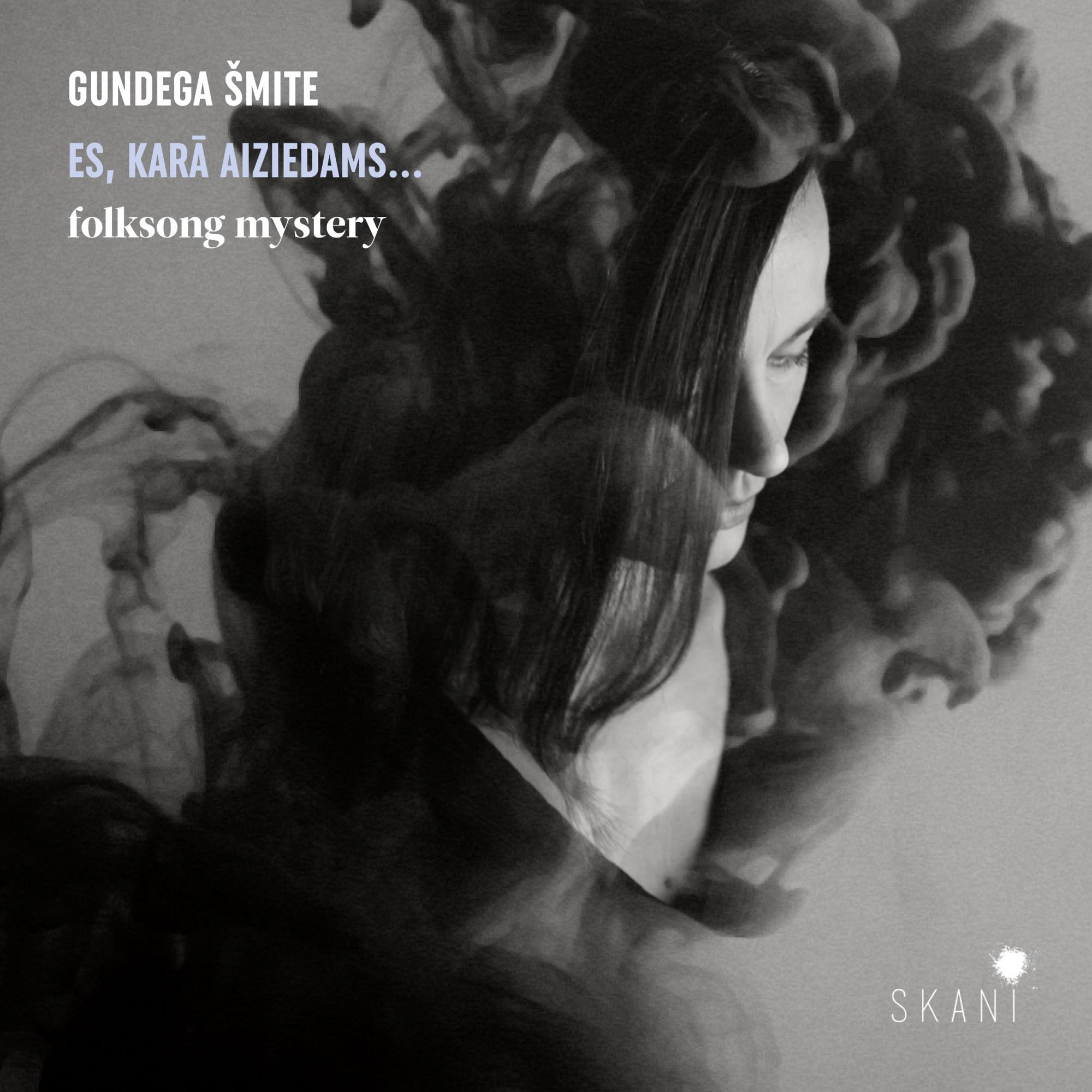With Latvia located between many larger powers, it is no surprise that many armies have crossed over and trampled Latvia throughout the centuries. War is also a recurring theme in Latvian folksongs – while some Latvian folksongs are heroic and are about the excitement of being a soldier and fighting in battle, there are many more songs that are tragic – about the toll that war takes on a person and a nation. Songs like ‘Div dūjiņas’ or ‘Es karā aiziedams’ reflect on the sadness and loss that results from war, as well as the inevitable heartbreak for families.
Latvian composer Gundega Šmite, using the wealth of folk material about war in Latvian folk songs and dainas, wove together what she calls a ‘folksong mystery’ – a chamber music work that combines both vocal and instrumental segments into a ‘story about the soul’s battle’, a work that is ‘dedicated to the souls that have been and continue to be extinguished by senseless war.’ Šmite enlisted the vocal instrumental ensemble Arcandela to perform this work, and a recording of Es, karā aiziedams was released in 2021.
The Arcandela ensemble is an eclectic collection of instruments and voices. The group, founded in 2015, is made up of soprano Aiga Bokanova, bass-baritone Kārlis Saržants, violinist Liene Brence, double bassist Oskars Bokanovs, Māris Rozenfelds on accordion and pianist Rihards Plešanovs.
Es, karā aiziedams has fourteen sections, with ten folksong interpretations and four instrumental interludes. It is often unsettling and harsh, and though it is based on Latvian folksongs, these are decidedly unmelodic interpretations and performances of them – as if to place emphasis on the text itself and the tragedy it describes. The burst of accordion that begins this performance, in ‘Kur tecēsi, mēnestiņi?’ is immediately unnerving and filled with dread, and the accordion is then supplemented by ominous sounds from the piano and violin, then joined by Bokanova and Saržants, singing folksong lyrics about the moon going to help young men in battle.
Many of the songs have themes of the soldier and his bride, about the sadness of them having to part, and potentially not seeing each other ever again. In ‘Lai ziedēja vainadziņš’, the bride and soldier have a dialogue, the bride questioning why the soldier wanted to marry her, and the soldier says he chose the girl who wept most sorrowfully. Bokanova and Saržants, with their expressive singing, illustrate the despondence of both. A similar atmosphere is generated in ‘Kara vīra līgaviņa’, where a mournful violin is joined by Bokanova’s disconsolate vocals in a song about a bride waiting (possibly in vain) for a soldier to return.
The hopelessness reaches a crescendo on ‘Labāk mani karā kāve’, a lament about how it would have been better to have been drowned as a child than to be raised as a soldier. Here Saržants sings in an almost grotesque manner, with the words themselves being pulled and squeezed, all the while a percussive hammer strikes (Šmite returns to this theme of a blacksmith in the final section of the work).
Es, karā aiziedams, Šmite’s vision of the nightmare of war and how it ruins lives and brings only sorrow is presented in a very expansive, almost explosive way at times, but elsewhere in an intimate and introspective way. It is difficult listening, full of harsh sounds and performances, but it will remain with the listener long after. The ensemble Arcandela vividly perform this vision, resulting in an almost cinematic performance. It remains vague what the ‘mystery’ is that is hinted at in the title of the work, but perhaps that is more meant to be a ‘mystery’ about why war and its associated heartbreak and tragedy is necessary. Šmite’s reinterpretation of these folksongs accentuates the sorrow and sadness contained within them. At times uneasy, at other times even frightening, Gundega Šmite and Arcandela have created an atmospheric and memorable Latvian musical perspective of war.
Egils Kaljo
www.latviansonline.com
_________________________________
The CD As I go off to War by the Latvian Gundega Šmite was released last year, and has since gained an unintended extra charge by the Russian invasion of Ukraine. It is a publication of the Latvian Music Information Centre, which is very active in the promotion of composers from Latvia.
This in stark contrast with the Netherlands, where the arts are basically considered a superfluous luxury. In the Baltic States, people cherish the connecting powers of art and music. Nor do they overlook women: As I go off to War is just one of several portrait cd’s the centre dedicated to women composers. In her fourteen-part cycle for soprano, bass-baritone, violin, double bass, accordion and piano, Šmite zooms in on the soldier’s life.
Folk poetry
The subtitle Dainu kamermisteria (Folksong Mystery) refers to a Latvian form of folk poetry and music that goes back centuries. A daina traditionally consists of short, four-line poems without rhyme, usually in the verse foot of a trochee. They are sung over a drone, often from a kokle, a Latvian psalter.
The texts generally display a pre-Christian symbolism and describe village life. Remarkably, any trace of heroes is lacking. Over 200,000 copies of these traditional songs have been collected in the National Library of Latvia.
Life questions
In the CD booklet Šmite writes that she has chosen ten poems which pose essential questions about life. Most importantly: who is prepared to sacrifice his life and happiness for a grand concept? She argues that this problem has occupied the minds of young Latvians for centuries. – For Ukrainians today the matter is rather less abstract: they simply have to fight in order to survive.
The ten dainas highlight different aspects of a soldier’s life: the parting of loved ones, the loss of those left behind, the futility of war and the soldier’s eventual return, dead or alive. ‘The verses describe the human weaknesses that surface as soon as a young man is called to arms,’ Šmite writes.
Most of the texts take a female perspective, of mothers, sisters and brides. This inevitably conjures up images of the countless Ukrainian women and children who have been cast adrift and are seeking refuge abroad. Once in a while a combatant himself describes his aversion to the bloodshed and begs to be allowed to stay at home.
Pacifist message
Šmite explicitly carries a pacifist message. Against all odds, she asks herself: ‘Will there come a time when we look back on the horrors of war as something from the past, which we have overcome thanks to our spiritual strength?’ – At the moment, the prospects are far from favourable.
In ten songs, separated by four instrumental intermezzi, Ensemble Arcandela leads us through a colourful soundscape. Mysterious rustlings of the violin, rhythmic drumming on the double bass, sparse piano notes and restless outbursts of the accordion express the various states of mind.
Šmite organically blends influences from folk and jazz in with modern composed music. The simple melody lines and the folkish, clear voice of soprano Aiga Bokanova at times bring Stravinsky’s Svadebka, the Peasant Wedding to mind. The repetitive motifs and the sonorous operatic voice of the bass-baritone Kārlis Saržants create a ritualistic, incantatory atmosphere.
Courage and perseverance
Although the music loses some of its impact as the cycle progresses, it poignantly expresses man’s suffering, courage and perseverance. An absolute highlight is the song ‘Neigh, neigh, grey horse’. Raw screams from the singers and furious Bartók-pizzicati from the double bass aptly express the soldier’s distress, and his desire to be released from the violence of war. Even if you do not understand Latvian, the tenor of the lyrics is perfectly understandable.
Recently, a Ukrainian woman shared on social media how a particular piece of music had comforted her in the bomb shelter. – May this CD also offer some solace to the plagued Ukrainians.
Thea Derks, 15/04/2022
atsauksme šeit

